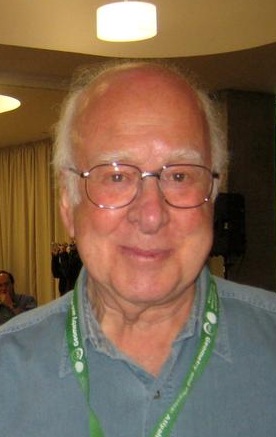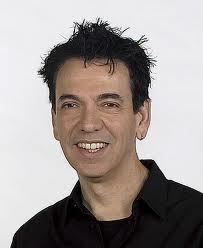Prof. Elam Gross, who headed the research group for the search for the Higgs in the Atlas Besarn experiment: all the researchers who worked hard at CERN also deserve a part of the prize, it's a shame that they don't do in physics what they do in the Nobel Peace Prize - give a prize to the organization.

The Nobel Prize Committee chose Prof. Peter Higgs and Prof. Francois Engler as winners of the 2013 Nobel Prize in Physics, for the discovery of the particle that gives the other particles their mass, as proven in the experiments conducted by thousands of scientists at two experimental centers in Sarn: Atlas and CMS.
The announcement of the win was delayed and the press conference at the Swedish Academy of Sciences took place an hour later than planned.
It should be noted that while Prof. Engler agreed to talk on the phone and answer the journalists' questions, Prof. Higgs 'went underground'.
Later today we will provide a detailed scientific review of the discovery.
Prof. Elam Gross from the Weizmann Institute, who served as the director of the search for the Higgs particle as part of the Atlas Besarn experiment at the time of the discovery, says in a conversation with the science website from an Atlas conference in Morocco about the winning of Peter Higgs and Francois Engler: "There is no doubt that Higgs and Engler deserve the Nobel Prize in my eyes. If they are actually the first among equals it is very difficult to decide and the Nobel Prize committee also had a hard time deciding. I have no doubt that Higgs Engler and Braud deserve the award and if Braud had passed away it would have been simpler to distribute the award. But it was appropriate to give part of the award to Jeffrey Goldstone as well. which deserved the prize in 2008 but then one of the partners in predicting the Nambu-Goldstone boson, Yoichiro Nambu, picked it up."
In 1964 the theoretical physicists François Englert and Robert Braut of the Free University of Brussels and Peter Higgs of the University of Edinburgh reached the same conclusion from two different aspects. "Higgs was the first to clearly outline the existence of the particle that last year, we found it in two different experiments at the LHC particle accelerator in Sarn," says Prof. Gross, who was the director of the Higgs search program for one of them - Atlas, in which approximately 3,000 physicists work. "There is also no doubt that Engler and the late Braud deserve the prize for clearly delineating the mechanism for spontaneous symmetry breaking, which is the mechanism that gives mass to elementary particles."
"These things were already known since the 5s, but understanding of the nature of the elementary particles only came in the 7s. And there is no doubt that they deserved the first among the group of XNUMX-XNUMX people and you can add to them Granik, Hagen, Kippel and Goldstone, who ran an almost close race. Gernik Hagen and Keppel published a paper only one month late after Higgs."
What is your share, the experimenters in Persia?
Prof. Gross: "The Nobel Prize is not given even to theoretical scientists unless there is experimental confirmation of the theory. Obviously, without the experimental work of nearly 6,000 experimenters at Atlas and CMS, Higgs and Engler would not have won. It is clear to me that the two attempts of Atlas and CMS also deserve a Nobel Prize because the particle would not have been discovered otherwise effort and original thinking were required. We discovered the particle against all expectations. No one thought that in this short time and with the amount of collisions and with the means at our disposal we would have succeeded. Without the tireless dedication and commitment of all the physicists who searched for the Higgs from the two partnerships - Atlas and CMS, we might have had to wait a few more years until we would have discovered the Higgs. We discovered the Higgs thanks to the fact that it has a mass that was accessible to us GeV 125 and also because many original techniques were developed to find the same needle in the haystack. We developed innovative techniques, upgraded the entire statistical method and the physicists who performed the experiments were truly great heroes. The two attempts are the great heroes of this story."

But you can't give a Nobel Prize to 6,000 people?
"It is indeed impossible to give a Nobel Prize to 6,000 people, but it can be given to their organization." says Prof. Gross. "Nobel Prize rules do not prohibit this. Although this is not customary in physics, it is a common phenomenon in the Nobel Peace Prize. What's more, it is not customary to give a Nobel Prize to experience and theory at the same time. Usually experience comes after theory and I wouldn't be surprised if that's what happened. I also think there is room to challenge the Nobel Prize committee again on the subject of awarding the Nobel Prize to great experiments. It should be remembered that physics (and also other sciences, for example the mapping of the human genome in biology or projects such as the blue brain) are moving towards great science. For example, who will receive a Nobel Prize when they discover dark matter? These will be experimenters. The Nobel Prize committee will have to learn to deal with this world of Big Science."
What does the fact that it took 40 years and especially a huge accelerator to confirm the existence of the Higgs mean? Is the old science of small laboratories over?
Prof. Gross: "The old world of laboratories has not ended and will never end. There will always be a place for science that is done in a small laboratory, but in the field of elementary particles, small science has become bankrupt for a number of reasons - first of all, the devices, accelerators or detectors cost a fortune - from millions to billions of dollars and to finance it you need many countries. there's nothing to do. Second, each country sends its own physicists and it adds up. Thirdly, it takes a lot of brains to analyze the data. The question of where small science ends and big science begins is subjective. Is 30 people looking for dark matter a little science or a big one? If 300 people are looking for a particle, is it small or big science? Today, 3,000 people are doing it. In my opinion, 30 or 3,000 people are the same. The time when Thompson discovered the electron with a tube that costs $100 is over. In a certain sense, both governments, universities and award committees have to deal with so-called big science.
Did the discovery of the Higgs help divert additional budgets to the field of particle physics?
Prof. Gross: "We believed that the discovery of the Higgs would bring more awareness and money and funding to the field of elementary particles or high energies. And to our surprise, the world created an atmosphere of 'have you found what you want? What is left to do? You've closed the corner' and it's very distorted because right now beyond that we need to learn and understand better what we found there is every reason to continue searching in new districts because it only shows that our thinking was correct and we understood the tip of the iceberg correctly but we didn't uncover the entire iceberg. You must understand that you can invest a lot of money to find out all the details and not cut corners. Give us funding to look for super symmetry and understand better how we arrived at one equation and not something complicated that consists of many equations. Give us funding to understand the theory of everything, how the universe was created. We have just started the journey, we are not there yet. The LHC is expected to have another 10-20 years of activity and there is a non-zero chance that we will discover new particles, but there is already talk that an accelerator with higher energies will not be built. There are a lot of questions about what might be beyond the standard model because it is not perfect and there are a lot of open questions in it. Israeli scientists are also investigating possible new physics beyond the standard model, such as Prof. Erez Etzion from Tel Aviv University, Prof. Shlomit Terem and Prof. Yoram Rosen from the Technion, Prof. Giora Mickenberg, Ehud Duchovani from the Weizmann Institute, are dealing with what is happening beyond the standard model."
The winners of the Nobel Prize in Chemistry will be announced tomorrow. See: Will the winner of the Nobel Prize in Chemistry in 2001 win again this year?
